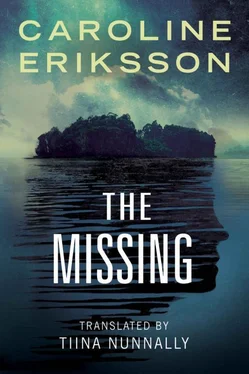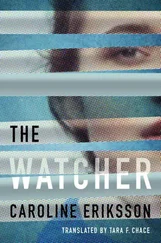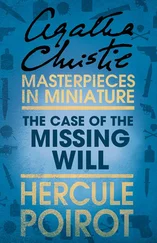The policewoman raises her hands, palms up.
“It’s not the official name. But I guess it is a little off-putting. Not exactly the kind of name that attracts tourists. But I’m new here. It was only a few days ago I heard that’s what the locals call the lake.”
And with that, she turns and takes a few steps toward the front entryway. Are they leaving? Already? Anxiously, I shift position, unable to decide whether I’m more afraid of having the police here or seeing them leave. I think about the black object hidden under the rug. The big mess in the room must have distracted the officers from noticing the bulge.
The male officer is already out in the hall when the policewoman pauses. She turns to look at the psychologist. And the corner of the rug. I hold my breath. Follow the officer’s gaze. I see Alex’s wife, Smilla’s mother, standing there in her blue dress, leaning against the wall as if she wishes she could disappear into it.
“And you? Who are you?”
The psychologist hesitates, doesn’t speak. I seem to see her slide down the wall, and I imagine her reaching out a trembling hand toward the floor. It might be real; it might be my imagination. Yes, who are you? That’s the question that races through my battered mind. Then I hear a familiar voice answer.
“A friend,” says Mama. “She’s a friend.”
I see the police officer turn back to look at my mother. Maybe Mama hesitated a second too long. But when she did speak, there wasn’t a trace of doubt in her voice. Now she nods to underscore her words. A friend. Yes. They look at each other. And I have a feeling my mother protecting the psychologist from the police isn’t only about me. There’s something else.
Both officers are now out in the front hall. I hear the door close after them. My mother and the psychologist study each other for a long moment. Mama breaks the silence.
“All right then. Give me the ax, and I’ll put it away. Then we’ll sit down and talk. You can ask me anything you like. I can tell you want to know.”
Both Mama and the psychologist move slowly. I watch as something black is picked up and changes hands. I hear footsteps leaving the room, a door opening, a clattering sound, and then the footsteps come back. No more sounds after that, except for voices, speaking quietly. A rushing inside my head. My eyes fall shut. I’m tired. So terribly tired.
I fall asleep and dream that Mama and my former psychologist are sitting across from me, at either end of the sofa, talking. And that, every once in a while, Mama leans forward to feel my forehead or straighten the pillow she has slipped under my head. In my dream, I hear the psychologist say: So your friend was in love with your husband? Was that why she told him about the slap? To make him leave you?
“Or else they were already having an affair,” I hear my mother say, and then I realize that I’m awake. “Maybe she felt rejected since he was continuing to see other women. Who knows?”
There is no bitterness or hatred in her voice when she talks about Ruth. It sounds more like she’s tired. At first I find this surprising. Then I think it’s strange I would have this reaction. Because what is the basis for my perception of my mother’s feelings or her view of what happened? I have never—never ever—curled up on the sofa beside her to discuss these things. Neither of us has ever made any serious attempt to initiate that kind of conversation. Mama may have tried when I was a teenager, but I brushed all her efforts aside. Then I moved away from home and withdrew even more, keeping my distance. And now we’ve ended up here.
They think I’m still asleep, and I let them, lying still and opening my eyes only a little bit. In the center of my field of vision, right in front of me, is a pair of slender legs. Not Mama’s. The sunlight streaming into the room falls in such a way that I can clearly see the unshaven hair on her calves. One foot is bobbing up and down, wearing a loose-fitting sandal. I see the peeling nail polish, some sort of hopeless pastel color. She’s sitting so close that I could reach out my hand and touch her. Caress her leg. Or scratch it.
“I have to ask… Afterward… Wasn’t there anyone who… I mean…”
The fact that she’s having such trouble saying the words makes me realize what she wants to know. Mama understands too. Of course.
“It was declared an accident. The neighbors in the apartments above and below had heard a man bellowing a while earlier and thought it must be the same man who came home late, making a lot of noise in the stairwell. The people who lived across the street told the police they’d seen the man smoking in the open window lots of times. They’d wondered how he dared, since he lived on such a high floor. The autopsy found alcohol in his blood, quite a lot. I think they even found pieces of the glass he’d been holding—”
I move abruptly, kicking out my leg so they can’t miss seeing it. Mama stops at once. Her face peers down at me from the sofa.
“Hello there. You fell asleep, and I decided not to wake you. Thought you could use a rest. I would have moved you, but… Well, you’re a little bigger now than the last time I carried you to bed.”
We look at each other. For a long moment. Until Mama blushes. She really does. She blushes, though only briefly. Then she hurries to regain control of the situation.
“How are you feeling?”
Even though I’ve been awake for several minutes, it’s only when I hear her question that I take stock. My head is no longer pounding fiercely. The headache is still there, but not as sharp. My shoulder still feels stiff and swollen, but the fever must have subsided. The nap seems to have done me good. How long did I sleep? A familiar, and yet peculiar, feeling starts up in my stomach.
“Hungry,” I say. “I’m hungry.”
I go out to the kitchen, walking with my mother’s arm around me for support, and there I eat several pieces of toast. I wonder what happened to the ax. I wonder what Mama has done with it, but I don’t ask. Smilla’s baby doll is lying facedown on the floor under the table. Her polka-dot dress has slid up so that the doll’s shiny plastic bottom peeks out. Slowly but deliberately, I reach for the doll, straighten her clothes, and set her on the chair next to me.
The effort prompts my bad shoulder to throb with pain. The lower part of my face and my neck hurt. I’m still exhausted, both from the fever and from the havoc of the past few days. Anxiously, I run my fingertips over the skin around my navel. Are you still in there? Deep inside, I feel something flutter. Something that’s fighting. Something that wants to live. Something or someone. It’s going to be fine. It has to be.
With my newly awakened appetite, I set about filling the gaping hole in my stomach while my mother rummages around in the bedroom and bathroom, packing up all my things. She works efficiently, in silence, moving with confidence, as if she’s never done anything other than rescue me from absurd situations. I’m guessing that her plan is to finish up as soon as possible and then drive me to the hospital. I wonder what she’s going to tell the doctors. It’s probably best not to ask, best for me to keep quiet and let Mama do the talking.
The psychologist stays out of our way, but I know she hasn’t left the cabin. Her presence is palpable. I assume she’s still in the living room. Pondering her next step, pondering her life? What do I know? The only thing I know is that if Mama trusts her, then I trust her too.
I’ve finally eaten my fill. Mama has wiped off the kitchen counter and carried out my suitcase.
“The car is parked outside,” she says, motioning toward the front door.
Читать дальше












